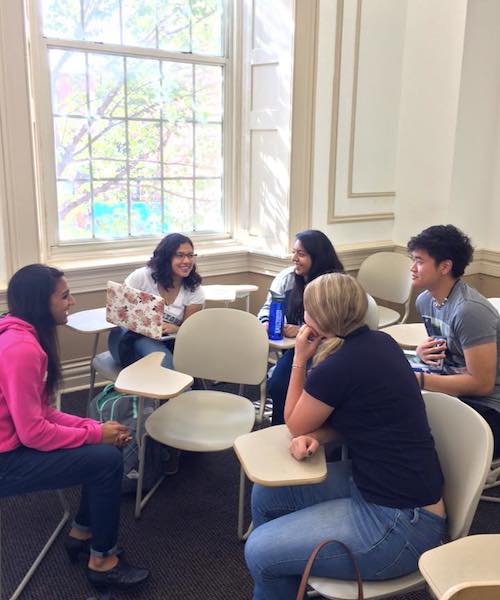Student-Centered Learning: A Conversation with Henry Schwarz

“Identify a problem in the world today. What does it look like? Find a way to change it.”
These were the words of English Professor Henry Schwarz, former director of the Program on Justice and Peace, on the first class of his Cultural Studies course in fall 2015.
After a brainstorming session, the class narrowed the range of topics that they would address throughout the semester. The result was five research groups that were each mandated to rigorously analyze one of the problems[1] and come up with solutions. At the end of the course, students were required to research organizations that would help bring the identified change to the world.
This experimental, student-centered approach incorporates a Studio/Lab concept as a portion of the course. The studio concept is a new initiative of the Global Future(s) Curriculum Studio, which supports curricular innovations to enhance student learning. Putting students at the center of their education challenges students intellectually, emotionally, and socially through their interactions with peers, says Schwarz. His fall 2015 curricular experiment aligns with a strong tradition of cura personalis at Georgetown University—education of the whole person.
“The object is to get groups of different people talking and organizing together around a variety of topics they might not otherwise explore, in an atmosphere of activist empowerment in which they feel responsibility about the outcome,” Schwarz explains.
He emphasizes that “students enjoy the collaboration and socialization of the group activity, and also enjoy the variety of exercises.” He finds that students who personally engage in research are much more enthusiastic and creative. He clarifies that although the course should be fun, it should not be easy. Demanding readings, exams, presentations, and regular writing assignments remain important elements of the course.
[1]The identified problems were 1. Images of African Americans in Media; 2. Women’s Inequality; 3. Industries and Environments; 4. Female Body Images; 5. Mental Illness and Addiction.
